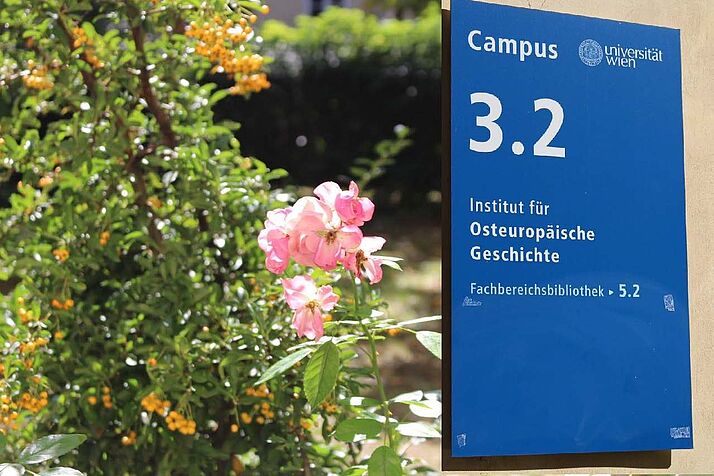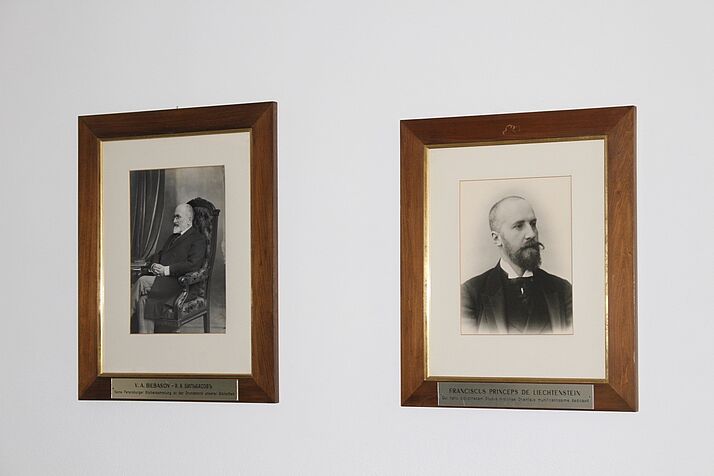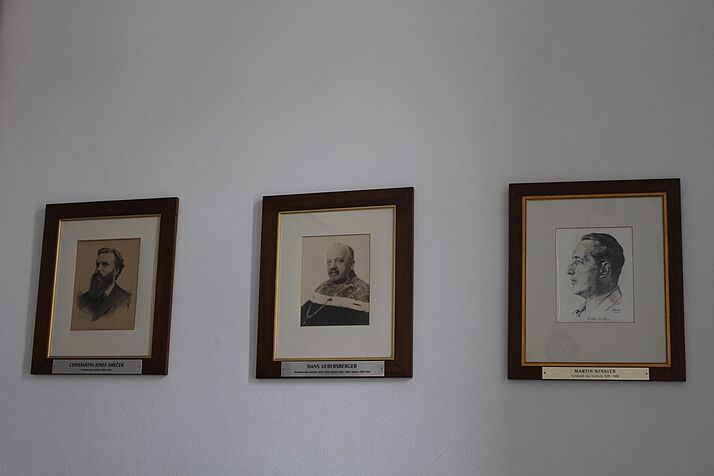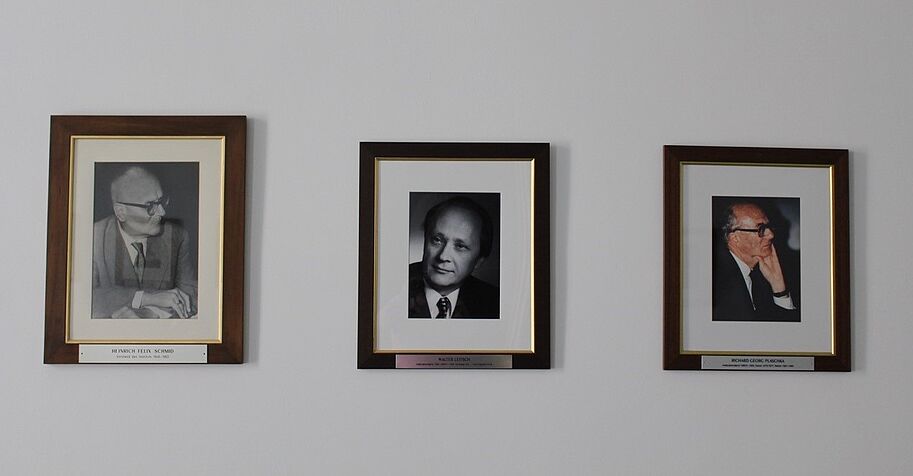History of the Department
A place of remembrance of the benefactor and founder Franz de Paula von und zu Liechtenstein
(Marija Wakounig)
The beginnings of the Department
On 11 December 1906, 109 wooden crates left the former capital of the Russian Empire, St. Petersburg, for the imperial capital of Vienna. The cargo consisted of approximately 10,000 books, which were not only physically heavy. They contained a whole series of "forbidden books" that would hardly have crossed the Russian border without difficulty even half a century later. Although voices were raised in St. Petersburg circles against this export even then, they were stifled by the Russian winter and the disinterest of the authorities, who were still dealing with the aftermath of the 1905 revolution and the Russo-Japanese War. Other European centres are also said to have been interested in this library, but on 5 January 1907 the crates of books finally arrived safely in a basement room of the main building of the University of Vienna on the Ring.
What may have looked like a secret service operation was intended to institutionalise a research undertaking in which the relations between the two empires were to be systematically processed by means of basic research and made available to academia, the interested public, the diplomatic service and, as a means of preventing disputes, the military. Franz de Paula Prince of Liechtenstein (1853-1938) became convinced of the urgent need for improved historical knowledge during his four years as ambassador to Russia (1894-1898). After his return, the Prince enabled and financed Hans Uebersberger's education in Russian, as well as his research trips to St. Petersburg and Moscow. In November 1906, he donated 40,000 crowns to purchase the book collection of the important Russian historian Vasilij Alekseevič Bil'basov (1838-1904); the Ministry for Culture and Education of the time appeared as the buyer. In 1906, the patron, who was well connected in the scientific community and had been the (long-standing) chairman of the Commission for Modern Austrian History at the Imperial Academy of Sciences, enabled the publication of the first habilitation thesis on Eastern European history in Vienna – even before the founding of the seminar (= department) and the existence of the subject of Eastern , Hans Uebersberger's Austria and Russia since the end of the 15th century. Volume 1: 1488–1605. Throughout his life, Liechtenstein retained a financial and conceptual interest in the university institution he had founded, although between 1929 and 1938, as Prince Franz I of Liechtenstein, he had to face other challenges.
With the valuable Bil'basov Library as its basic endowment (fundus instructus), the "Seminar for East European History" was established by ministerial decree on 14 August 1907. The official designations of the department changed several times, reflecting the history of the subject at the University of Vienna: Until 1948 it was called the "Seminar for Eastern European History", then "Seminar for Eastern European History and South-East Research", from 1956 "Department of Eastern European History and South-East Research", from 1978 "Department for East and South-East European Studies" and since 2000 "Department of Eastern European History".
The history of the department also reflects the customary international division of the subject area of Eastern European history into three parts. Although it started out with two sub-areas (Eastern Europe, Southeastern Europe) – Eastern Central Europe was added in 1948 – only the history of Eastern Europe in the narrower sense (with a focus on Russia and Poland) was taught throughout. This first Eastern Europe lectureship was converted into an associate professorship in 1910 and into a full professorship in Eastern European History in 1916, making it the founding professorship of the department. Despite being re-staffed several times – a total of six times since 1934 – it was only in the course of the 2002 University Act that it was designated and in 2017 filled as a professorship for Russian history. The professorship in Slavic Philology and Classical Studies, which Konstantin Jireček initially held at the Department of Slavic Philology from 1893 and at the Department of Eastern European History from 1907 to 1918, was only revived in 1965, initially as an associate professorship and from 1967 as a full professorship in Eastern European History with a special focus on the West and South Slavs was revived in 1965, initially as an associate professorship and from 1967 as a full professorship; in 1993 it was filled as a professorship for the History of Eastern Central Europe and in 2010 finally as a professorship for History of Eastern Central Europe/Nation Building. The professorship for Southeast European History, which has existed since 2005, emerged in 1992 from an associate professorship that was converted into a professorship in 2000 (after UOG 1999). The professorship for Societies and Cultures of Remembrance in Eastern Europe, which has been filled since 2012, developed from the associate professorship originally established in 1994, which in 2000 (after UOG 1999) was designated as the professorship for "; the professorship for Eastern and Southeastern European History, which has been filled since April 2019 (pursuant to §99/4 UG), also emerged from an associate professorship.
The Department today
The subject of Eastern European History has been a high priority at the University of Vienna for over 110 years. This is a result of the special geopolitical, economic, social, cultural and mental conditions of Vienna and its specific environment.
The Department of European History currently employs 19 members of staff, 15 of whom are academic and four of whom are general university staff. In addition, since 2017, the affiliated Research Cluster for the Study of East Central Europe and the History of Transformations (RECET) has provided excellent working conditions for research fellows and project staff. During the academic year, a varying number of lecturers and guest researchers from various universities and research institutions in Austria and abroad are added to this. All of the researchers working at the department are qualified historians. Since the introduction of the new Austrian University Organisation Act (UOG) in 1975, all of them have been integrated into the History Department in their teaching activities. Nevertheless, great importance is attached to interdisciplinary teaching and research; this is reflected not only in the proximity to the Institute of Slavonic Studies as joint residents of Hof 3 on the university campus, but also in the fact that students of Slavonic Studies, Political Science, Jewish Studies, Romance Studies, Byzantine Studies, etc. traditionally take part in the courses taught by the members of the department. This circumstance was taken into account in 2015 with the establishment of the Master's programme in Interdisciplinary Eastern European Studies. Between 2007 and 2019, the department was also one of the main supporters of the interdisciplinary doctoral programme Galicia, a forerunner of the prospective doctoral schools at the University of Vienna. Since 2007, the department has also been part of the nine globally networked Austrian and Central European Centers, funded by the Austrian Federal Ministry of Education, Science and Research, which offer promising PhD students annual conferences, exchange and networking opportunities with international scholars and publication opportunities.
The Department of Eastern European History can justifiably count itself lucky to be historically the second oldest in the German-speaking world and currently the only one in the world – thanks to its scholars – to be able to offer the entire three-part subject in teaching and research in its geographical breadth and historical depth from the Middle Ages to the present.
The Department and its Memoria
It is part of the tradition of the Department to celebrate whenever the occasion arises. While the 50th anniversary in the 51st year was celebrated in June 1958 with a ceremony at the University of Vienna, an exhibition at the Haus-, Hof- und Staatsarchiv and a reception at the Vienna City Hall with international participation, on the occasion of the 75th anniversary of its founding in the 76th year, the then board of directors presented one of the first university department histories published in Austria, in which the "ugly years" of National Socialism were not left out as early as 1983. The 100th anniversary in 2007 was celebrated in a manner befitting the occasion with a reception at the Palais Liechtenstein in Rossau, including a book presentation and honorary lecture by Prince Hans Adam II, a celebratory lecture in the Great Hall of the University of Vienna, and a two-day conference at the department's premises on the university campus (30 September–2 October 2007). The 111th anniversary of the Institute coincided with the 20th anniversary of the University of Vienna Campus 1998–2018. Together with the Department of Slavonic Studies, with which our department has shared Hof 3 since moving from Liebiggasse to the university campus, a themed week (1–6 October 2018) and an exhibition were organised under the motto Fascinating Eastern Europe: diverse – magnificent – marvellous ( and an exhibition (stream.univie.ac.at/media/his




